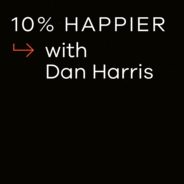It can be incredibly frustrating when life-changing, world-changing concepts such as compassion and kindness are often presented as cliches, because scientific research strongly suggests that learning how to practice compassion -- through meditation and other modalities -- can genuinely change your life. And enough of us did it, it could maybe change the world. One of the people who is the best at getting this message out, in new and creative ways, is Thupten Jinpa. He is a former Tibetan monk who went on to go to Cambridge University, where he got a B.A. in philosophy and a Ph.D. in religious studies. Since 1985, he has been the principal English translator for His Holiness the Dalai Lama. In this conversation, we talk about developing a compassionate meditation practice, building kindness and empathy, the connection between intention setting and compassion, and identifying and regulating negative emotional reactions. A few technical notes: This episode is a rerun. We do reruns when we have episodes that are amazing that we think our newer listeners might enjoy. We also do them to give our staff a break once in a while. We actually recorded this conversation live in front of an audience at the Asia Society in New York City a few years ago. It was the day after the school shooting in Parkland, so you will hear a few references to that. Check out Joseph Goldstein's course on compassion in the Ten Percent Happier app: https://10percenthappier.app.link/CompassionWithJoseph Full Shownotes: https://www.tenpercent.com/podcast-episode/thupten-jinpa-repost

Gesundheit, Wellness & BeautyLeben & Liebe
10% Happier with Dan Harris Folgen
Self-help for smart people. World-class insights and practices from experts in modern science and ancient wisdom. Hosted by veteran journalist and best-selling author, Dan Harris.
Folgen von 10% Happier with Dan Harris
947 Folgen
-
Folge vom 21.07.2021The Art and Science of Compassion | Thupten Jinpa
-
Folge vom 19.07.2021The Voice in Your Head | Ethan KrossThe craving, complaining, and comparing voice in our heads can be the source of incalculable suffering, but is it all bad? And are there ways to talk to yourself that can turn your inner voice into a powerful ally? Ethan Kross is a Professor in the University of Michigan's top ranked Psychology Department and its Ross School of Business and the author of the new book, Chatter: The Voice in Our Head, Why it Matters, and How to Harness It. In this conversation, we talk about why we have voices inside our head, how they can be either a blessing or a curse, how to access your inner coach rather than your inner critic, how changing our outer environment can impact your inner environment, and how you can use the much-maligned social media for support. Download the Ten Percent Happier app today: https://10percenthappier.app.link/install Full Shownotes: https://www.tenpercent.com/podcast-episode/ethan-kross-365
-
Folge vom 14.07.2021Getting Over Yourself | Joseph GoldsteinFor the uninitiated, Joseph Goldstein is one of the cofounders of the Insight Meditation Society (IMS) alongside Sharon Salzberg and Jack Kornfield. Since its founding, thousands of people from around the world have come to IMS to learn mindfulness from leaders in the field. In this episode Joseph covers strategies for getting over yourself. Every year, Joseph does a three-month retreat by himself at his home in Massachusetts. This year, he emerged with a bunch of thoughts on what's called "the three proliferating tendencies," or three "prapancas," to use the ancient Pali term. These are three ways in which we perpetuate a sense of self -- not a healthy sense of self, but an unhealthy sense of self. You can think about the process of going deeper in meditation as a process of lightening up or getting less self-centered. Now, you're about to get a master class in doing just that. Download the Ten Percent Happier app today: https://10percenthappier.app.link/install Full Shownotes: https://www.tenpercent.com/podcast-episode/joseph-goldstein-364
-
Folge vom 12.07.2021How to Keep Your Relationships On the Rails | Kaira Jewel LingoToday's episode is about a Buddhist tool for resolving conflict and keeping your relationships healthy. Today's guest, Kaira Jewel Lingo, was an ordained nun of 15 years in Thich Nhat Hanh's Order of Interbeing, and is now a lay Dharma teacher based on Long Island. She graduated from Stanford University with a B.A. and M.A. in Anthropology and Social Sciences. She's edited a few books by Thich Nhat Hanh, including Planting Seeds: Practicing Mindfulness with Children. In this interview, Kaira Jewel talks about: the Beginning Anew practice (and how even skeptics can see the value in it); how Beginning Anew can strengthen relationships and resolve conflicts; the four steps of the practice; and her own experience with the practice, as both a teacher of it and a practitioner of it. If Kaira Jewel's insights on gratitude within the practice intrigue or inspire you, you might like a fantastic meditation we released recently on the Ten Percent Happier app called "Daily Gratitude Booster" by Matthew Hepburn. It's the perfect way to cultivate a regular practice of gratitude, which, like meditation itself, is a skill that you can improve. Check it out by downloading the Ten Percent Happier app wherever you get your apps (https://10percenthappier.app.link/install) or click the link in our show notes to be taken directly to Matthew's meditation: https://10percenthappier.app.link/DailyGratitudeBooster. Full Shownotes: https://www.tenpercent.com/podcast-episode/kaira-jewel-lingo-363
